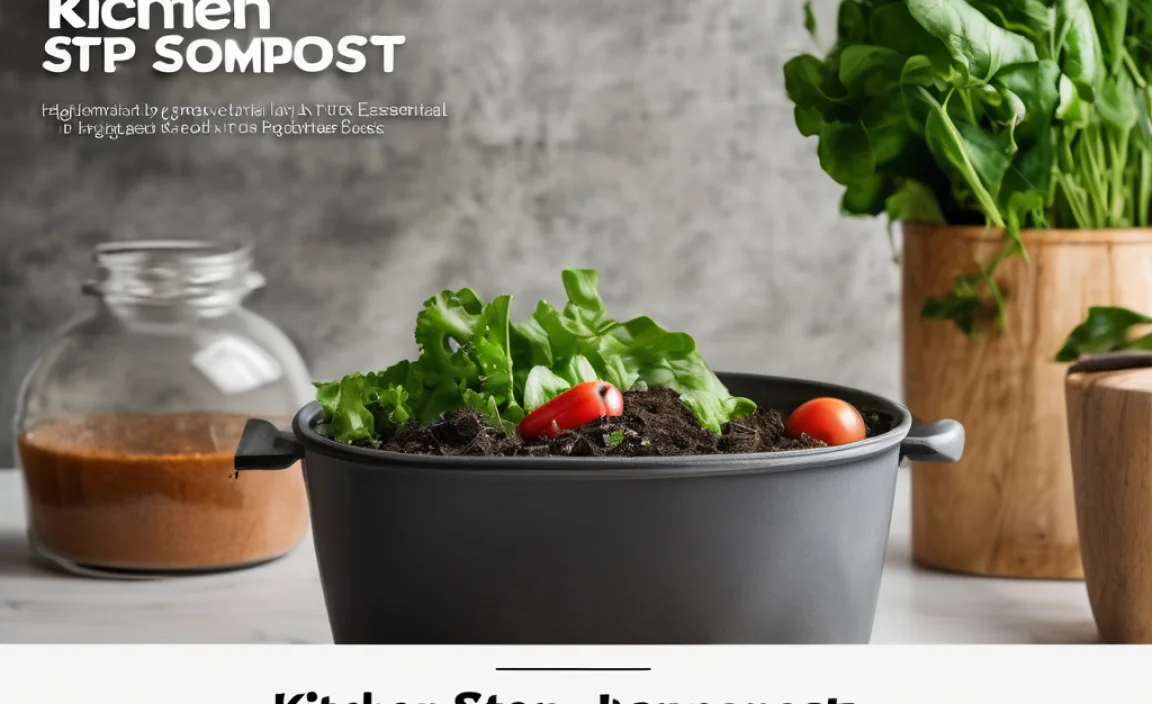Have you ever smelled something funny near your compost bin? Sometimes, composting creates strange odors. But don’t worry! It’s all part of turning waste into something good for the earth. Let’s learn more about composting odor and how to handle it.
Composting is a fun way to recycle. It helps plants grow by turning waste into rich soil. But what happens if it smells bad? The key is understanding why composting odor occurs. Once you know, you can stop the smell and keep composting fun.
Key Takeaways
- Composting can sometimes create unpleasant odors.
- Good compost needs the right mix of materials.
- Too much moisture can cause bad smells.
- Airing out the pile reduces composting odor.
- Composting helps recycle and enrich soil.
Understanding Composting Odor
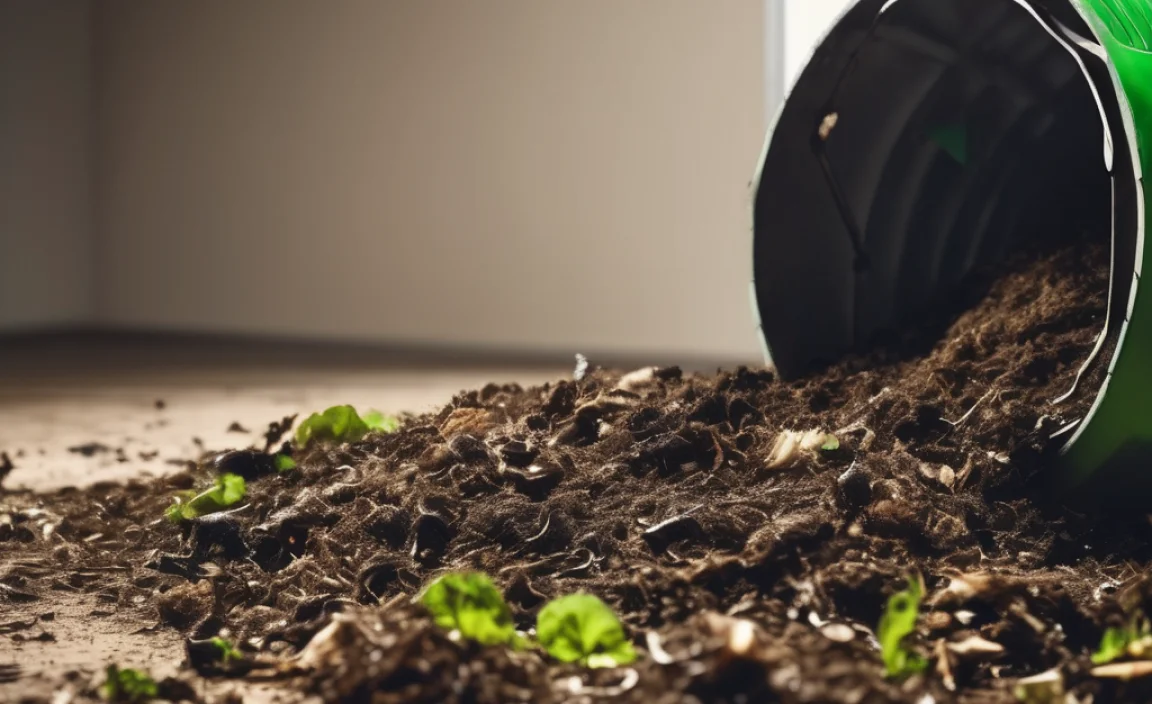
Composting is a process that breaks down organic waste. Sometimes, it creates a bad smell. This happens when the mix is off balance. Composting needs the right blend of “greens” and “browns.” Greens are things like fruit scraps. Browns include dry leaves or paper. An imbalance in these materials can cause composting odor. If there’s too much of one, the pile might smell.
- Mix equal parts greens and browns.
- Avoid adding too many wet items.
- Turn the pile regularly.
- Check for excess moisture.
- Keep the compost bin ventilated.
- Add more browns to balance the pile.
If your compost smells, it might need more air or dry material. Turning the pile helps air reach all parts. If it’s too wet, add some dry leaves or paper. A balanced pile should not smell bad. It should have a pleasant earthy scent.
Fun Fact or Stats : Did you know? Proper composting can reduce household waste by up to 30%!
Why Does My Compost Smell?
If your compost smells, it might be due to too much moisture. Have you ever left fruit in a bag too long? It gets mushy and smelly, right? The same happens in compost. Wet materials break down differently. They make the pile smell. So, add dry leaves or paper to absorb moisture.
What Should I Avoid Adding?
Not everything should go in the compost. Have you ever added meat or dairy by mistake? These can make the compost smell terrible. Stick with fruits, veggies, and leaves. Avoid putting in oils or greasy foods. These items attract pests and create bad odors.
How Can I Improve Airflow?
Good air circulation helps stop bad composting odor. Have you ever tried to breathe in a stuffy room? It feels uncomfortable, right? Compost needs air too. Use a pitchfork to turn the pile often. This lets air reach all the materials. It helps them break down evenly without smelling.
Creating the Perfect Compost Mix
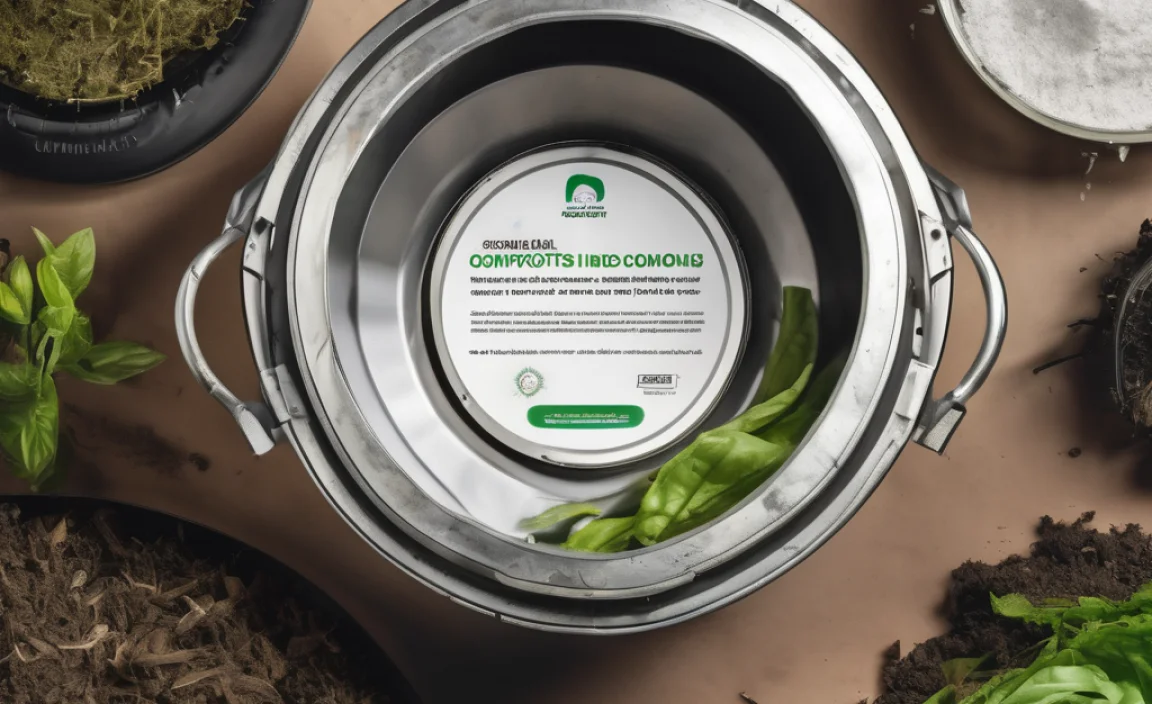
Creating the right compost mix helps reduce odor. The key is the balance between greens and browns. If you add too many fruit scraps, the pile might smell. Too many dry leaves can slow down the process. You need the right mix for happy compost.
- Balance moist and dry materials.
- Chop big pieces into smaller ones.
- Avoid adding too much grass clippings.
- Keep meat and dairy out of the pile.
- Turn the pile every few weeks.
- Add a variety of materials.
Think of it like baking a cake. You need the right ingredients in the right amounts. This ensures your compost is healthy and odor-free. With practice, you’ll find the perfect recipe for your compost pile.
Fun Fact or Stats : Composting can save up to 1.3 billion pounds of waste annually!
What Are Greens and Browns?
Greens and browns are key to composting. Greens are wet and rich in nitrogen. Examples are fruit scraps and coffee grounds. Browns are dry and rich in carbon. Think of leaves and shredded paper. Balance these for a perfect compost mix.
Can I Compost During Winter?
Yes, you can compost in winter! The pile might slow down but it keeps working. Have you ever seen a pile of leaves steaming in the cold? That’s composting in action. Keep the pile covered to retain heat. Add more browns to prevent sogginess.
How Often Should I Turn the Pile?
Turning the pile helps air flow. It speeds up the composting process. Have you ever stirred a pot of soup? It mixes the ingredients evenly. Turn your compost every few weeks. This helps the materials break down without making bad smells.
Managing Moisture Levels in Compost
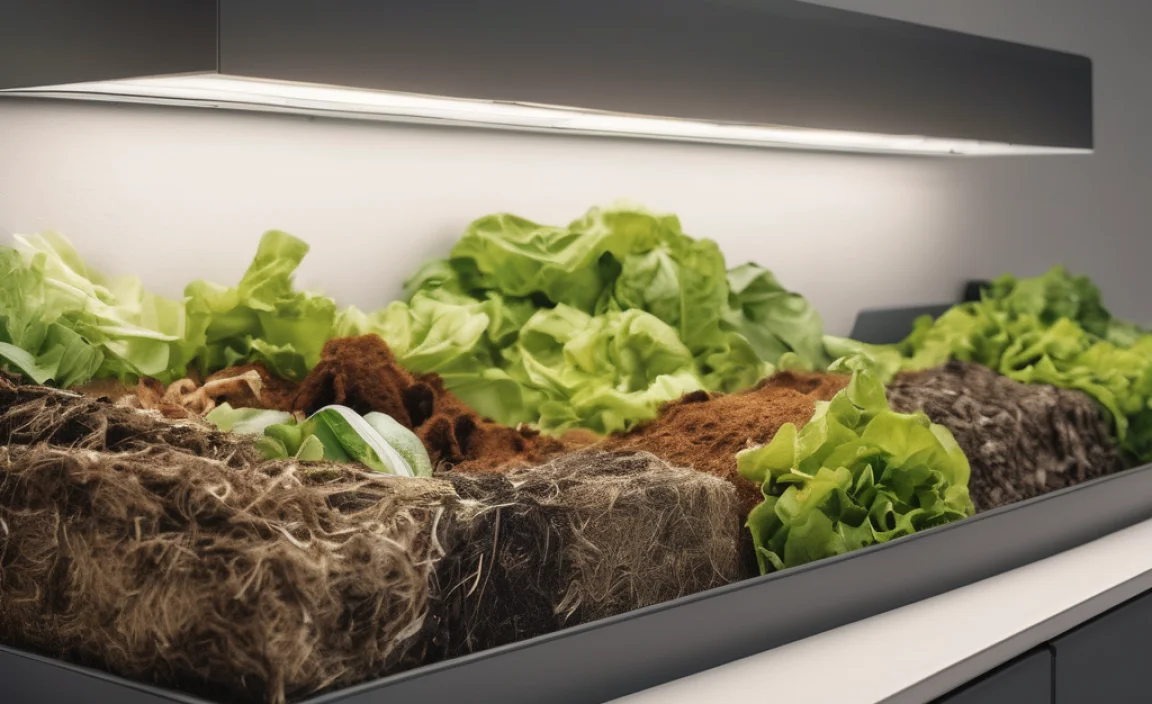
Too much moisture in your compost can cause a bad smell. Have you ever left a wet towel in a bag? It starts to smell, right? The same happens with compost. It needs the right amount of moisture. Not too wet, not too dry. This balance helps stop composting odor.
- Check the moisture regularly.
- Squeeze test: it should feel like a damp sponge.
- Add dry leaves if too wet.
- Sprinkle water if too dry.
- Cover the pile during heavy rain.
- Ensure the bin has drainage holes.
Moisture control is simple. Just like watering a plant, compost needs just enough water. Too much and it will drown, too little and it won’t grow. Adjust as needed for the best results.
Fun Fact or Stats : Composting reduces the need for chemical fertilizers!
How Does Moisture Affect Composting?
Moisture affects how compost breaks down. Have you ever watered a plant too much? It can harm the plant. Compost is similar. Too much water slows down decay and creates odor. Keep compost like a damp sponge, squeezing out extra water if needed.
What If My Compost Dries Out?
Dry compost slows the process. Have you ever tried to crumble a dry cookie? It breaks apart easily. Dry compost does the same. Add water to a dry pile. Turn it to mix the moisture evenly. This helps materials break down properly.
Can Rain Affect My Compost?
Yes, rain can soak your compost. Have you walked in heavy rain without an umbrella? You end up soaked. Rain does that to compost too. Cover the pile with a tarp during storms. This stops it from getting too wet and keeps the balance.
Benefits of Proper Airflow
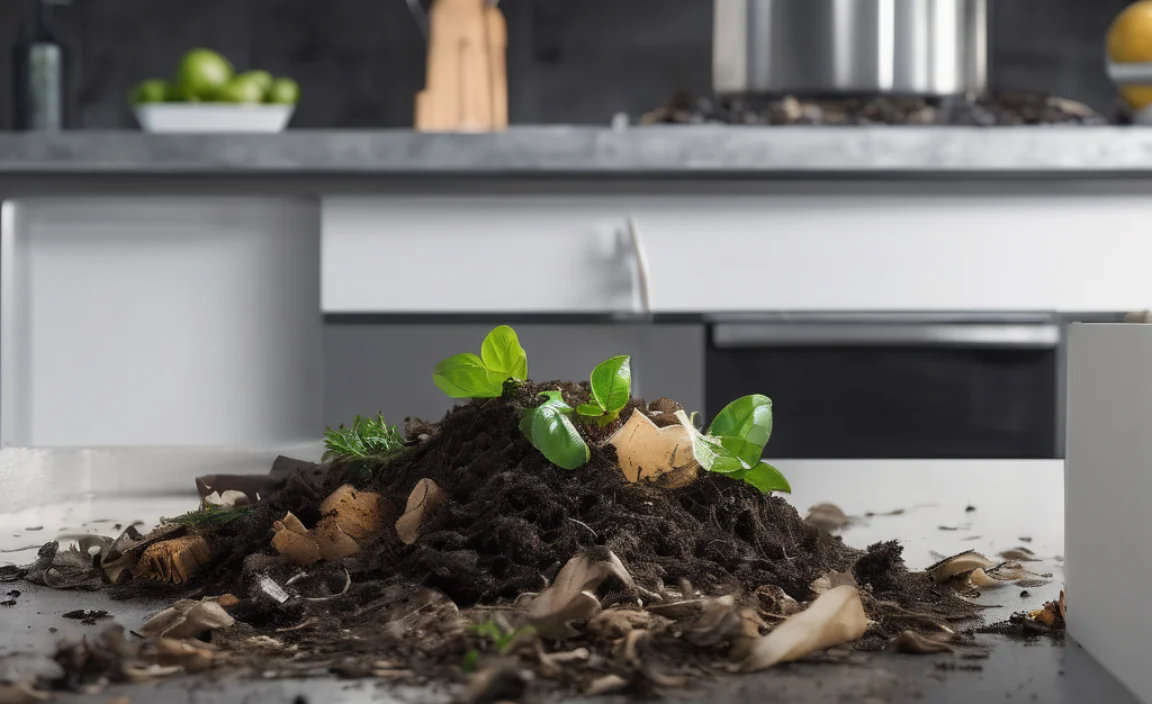
Adequate airflow is crucial for composting. Air helps break down materials faster. Without it, composting odor occurs. Like a stuffy room, the pile needs fresh air. Regularly turning the pile helps air reach all parts. This prevents bad smells and speeds up composting.
- Turn the pile every few weeks.
- Use a pitchfork or shovel.
- Create air pockets by adding sticks.
- Ensure bin has ventilation holes.
- Avoid compacting the pile.
- Add coarse materials for structure.
Think of airflow as the compost’s breath. It needs regular fresh air to stay healthy. Turning the pile is like opening a window. It refreshes the compost and keeps it working well.
Fun Fact or Stats : Turning compost can double its breakdown speed!
How Does Airflow Help Compost?
Airflow helps compost breathe. Have you ever opened a window for fresh air? It feels refreshing. Compost needs the same. Air helps microorganisms break down materials without creating odor. Turn the pile often to keep it fresh and active.
What Tools Can I Use?
Use simple tools for turning compost. Have you ever used a stick to poke a fire? A pitchfork works like that for compost. It helps mix materials and adds air. A shovel works too. Regular turning prevents odor and speeds up the process.
Can I Add Sticks for Airflow?
Yes, sticks help airflow in compost. Have you ever seen how logs help a campfire breathe? Sticks do the same for compost. They create air pockets. Add small branches or twigs. This helps air circulate and keeps the pile smelling fresh.
Common Composting Mistakes
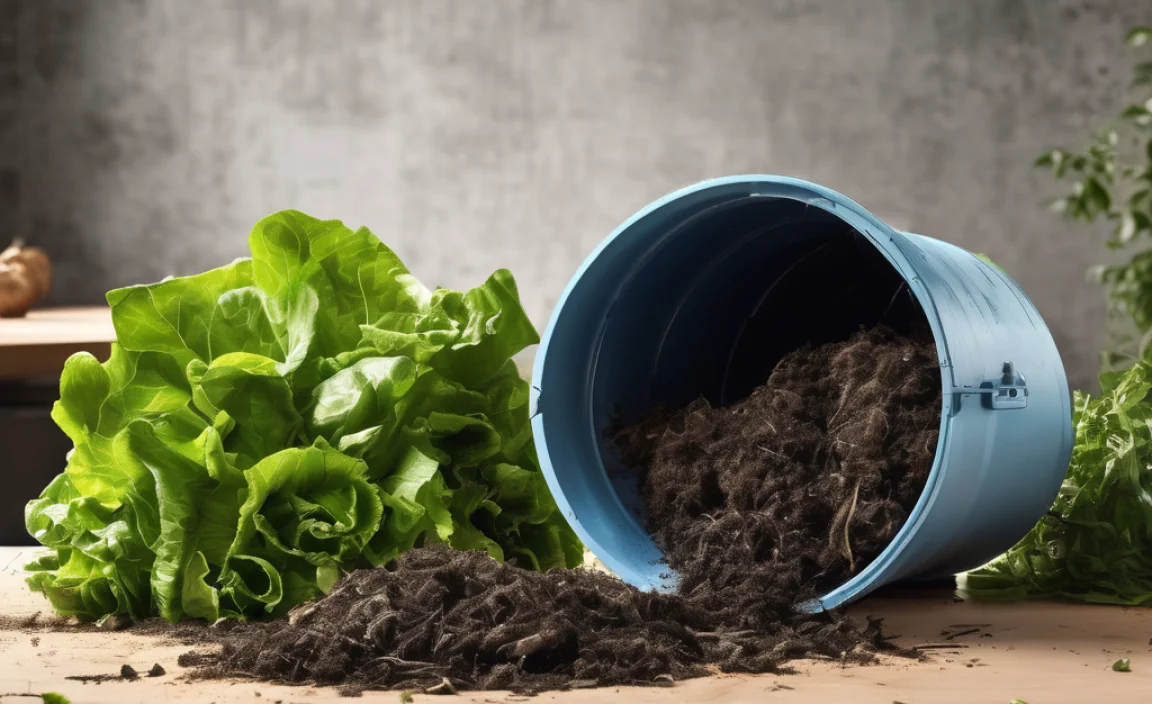
Many people make simple mistakes in composting. These can cause unwanted odors. Ever put too many fruit scraps in your pile? It might have smelled bad. Learning what to avoid can keep your compost smelling good. Let’s explore common composting errors and how to fix them.
- Avoid overloading with one type of waste.
- Don’t add meat, dairy, or oils.
- Balance green and brown materials.
- Turn the pile to add air.
- Check moisture levels regularly.
- Keep compost covered to retain heat.
Everyone makes mistakes, but they can be fixed. Remember, a balanced pile is key. With practice, you’ll master composting and say goodbye to bad odors. Keep experimenting and learning for the best results.
Fun Fact or Stats : Composting can reduce carbon footprint by cutting landfill waste!
Why Avoid Meat and Dairy?
Meat and dairy don’t belong in compost. Have you ever smelled spoiled milk? It’s unpleasant. These items attract pests and create odor. Stick to plant-based scraps. This keeps the compost healthy and pest-free.
Can I Add Weeds to Compost?
Yes, but be cautious. Have you ever pulled a weed only to see it grow back? Some weeds might survive composting. If they’ve gone to seed, avoid adding them. Otherwise, they can return. Hot compost piles can break them down safely.
How Do I Fix a Smelly Pile?
A smelly pile needs adjustments. Have you ever had to fix a friendship after a fight? Compost is similar. Balance greens and browns. Add air by turning the pile. Reduce moisture by adding dry materials. This helps restore the balance and stops the smell.
Conclusion
Composting is a great way to help our planet. But sometimes, a composting odor can occur. By understanding the right mix and managing moisture, you can keep your compost smelling fresh. Remember to turn the pile regularly. This adds air and speeds up the process.
FAQs
Question: What is composting odor?
Answer: Composting odor is the smell that sometimes comes from a compost pile. It happens when the mixture is unbalanced, too wet, or lacks air. Proper management stops the smell.
Question: How do I stop compost from smelling bad?
Answer: Balance the green and brown materials. Add dry leaves if it’s too wet. Turn the pile to add air. Avoid adding meat or dairy. These steps help stop composting odor.
Question: Can I compost meat and dairy?
Answer: No, it’s best to avoid meat and dairy in compost. They attract pests and create bad smells. Stick to fruit, veggie scraps, and dry leaves for a healthy pile.
Question: Why does my compost smell like rotten eggs?
Answer: A rotten egg smell often means the pile lacks air. It could also be too wet. Turn the pile to add air and balance the moisture by adding dry materials. This helps stop the smell.
Question: How often should I turn my compost pile?
Answer: Turn your compost pile every few weeks. Regular turning helps mix the materials. It also adds air, which stops bad smells and speeds up decomposition. It keeps the pile healthy.
Question: Can I compost in a small space?
Answer: Yes, you can compost in small spaces! Use a compact bin or a tumbler. Follow the same balance rules for materials. Regularly turn the contents to manage composting odor. You can even use a worm bin inside!

